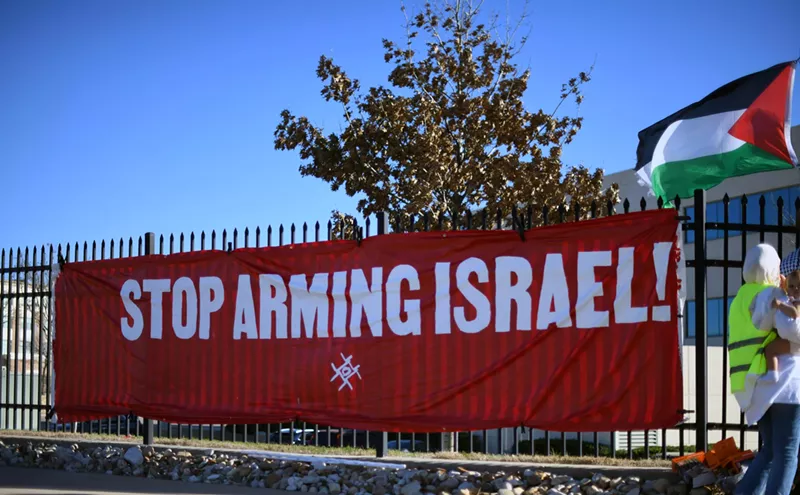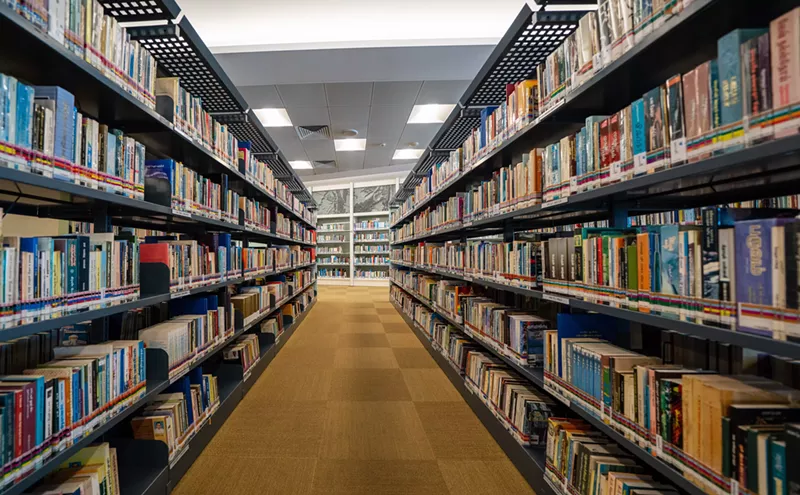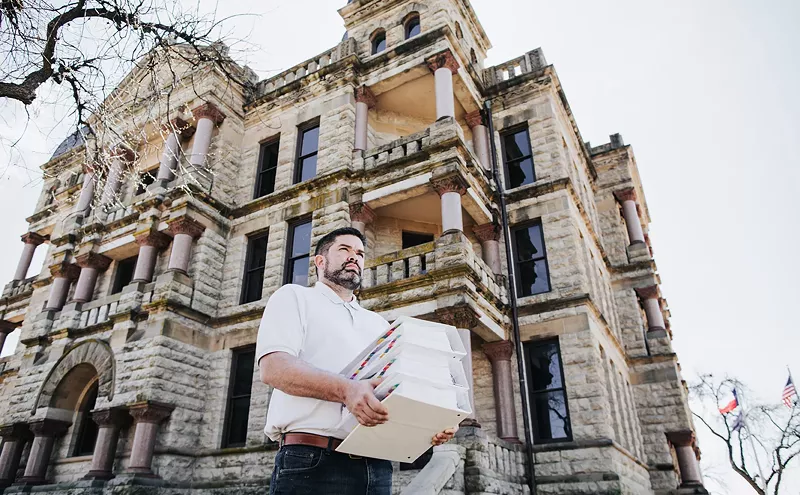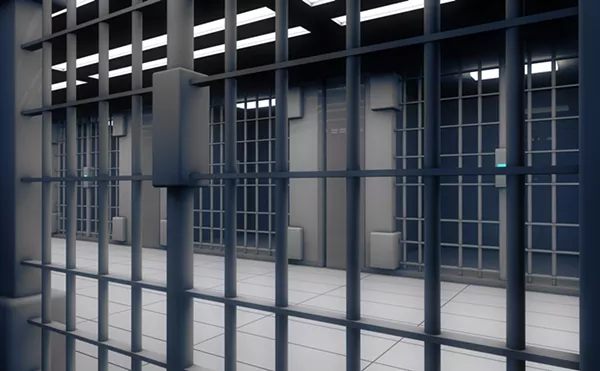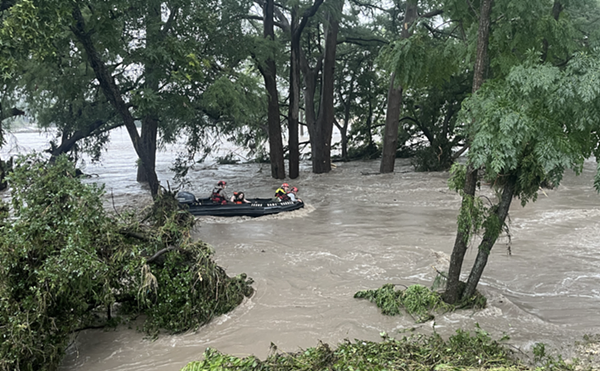A week before the trip, her bosses at Susquehanna Radio Corp. had broken the news to staff: Merge was gone, and in its place would be The Bone, spinning "classic Texas rock that rocks," or so the new slogan went. Merge listeners had no idea of the change in plans. Until, of course, some of them met Yvonne (whose full name is Yvonne Monet) at Dallas-Fort Worth International Airport for a weekend of swooshing down the slopes with a jock from their favorite radio station. Except it ceased to exist by the time they arrived at the terminal.
"They're all like, 'What happened? What's happening to the station?' And I couldn't say it," says Yvonne, who now works the 10 a.m.-to-3 p.m. shift. "I had to keep my mouth shut until we got on the plane. 'OK, now I can tell you. Merge is no more.' It was weird. I couldn't even hear the station's take on it. I wasn't around. I wasn't in town. I got home and there are all these messages from my friends, because I couldn't tell anybody. 'Oh, my God, are you fired? What's happening? You're not on the air. The station's changed. I'm so sorry.' So it was an interesting weekend."
If the listeners were surprised, most radio observers were not. The format change was the third in less than six years for the troubled 93.3 frequency: It signed on October 31, 1996, as the adult-alternative KKZN-FM (a.k.a. The Zone), then made itself over as the "cool rock, smart pop" Internet-savvy Merge in August 1999. Many thought that The Bone, feeding listeners a steady diet of AC/DC and ZZ Top and pretty much anything with amps that go to 11, would not be its last incarnation, only the latest one.
Then the first Arbitron ratings book arrived April 26: During its first three months on the air, The Bone ranked No. 11 in the overall ratings (which estimate the amount of listeners among people 12 and older) and No. 1 in its target demographic--and the one advertisers covet--men 25 to 54. The turnaround? In its last ratings book as Merge, 93.3 rated only 24th out of the 40 or so ranked stations in D-FW and No. 20 with men 25 to 54. Meanwhile, KZPS-FM (92.5), The Bone's classic-rock competition, fell from No. 11 into a tie for 16th, and KEGL-FM (97.1), another rock rival for the prime 25-to-54 demo, dropped from No. 9 to No. 22. Everything old, it seemed, was new again.
Yet The Bone's success in its first seven months on the air goes beyond the numbers. In less than a year, the station appears to have awoken the sleeping giant that is the Dallas rock-radio fan, the listener who dozed off when Q102 went silent in 1998, or maybe when The Zoo signed off more than a decade ago. At Merge, the phones never rang unless one of the jocks was giving away R.E.M. tickets; at The Bone, the phone bank in the studio is permanently lit up, with guys calling, for example, to tell nighttime host Channing how their ex-girlfriend used to "deep-throat a Twinkie." At Merge, they couldn't give T-shirts away; at The Bone, fans offer to buy them off the backs of the DJs at appearances. Merge was a ghost town, and The Bone is a 24-hour party, led by the on-air talent and, as program director Scott Strong puts it, the station's "hell-yeah attitude." (Cynics would suggest, however, that the attitude amounts to little more than lowbrow allusions to the station's name, such as, "We'll rock your Bone.")
"One thing that we're always looking at when we're critiquing The Bone: Are we having fun?" Strong says. He was lured away from his job as a radio consultant at Colorado-based SBR Creative Media to program Merge and was a driving force behind the switch to The Bone. "Every jock on air should be having a great time. Yeah, there's pressure. You have to get numbers; advertisers have to spend money on you. But at the same time, the audience can tell if you're having fun. I tell the jocks that they should be like, when they're on the air, like at a bar. Pick your favorite bar. And they're just sitting there talking, having a couple of beers, having a great time. That's what the audience wants, not some guy dictating to them, or pushing down their throat that this song was from 1969 and here's what I was doing then. Who cares?"
The current skirmish between The Bone and KZPS and KEGL is more than just a simple radio war. It's a testament to the cyclical nature of the radio business. Five years ago, when Chancellor Media Corp. pulled Q102 off the air, it did so because the company's research had revealed that the station's demographic was not "desirable," according to George Toulas, Chancellor's regional senior vice president of operations. And yet, now, by doing almost exactly what Q102 used to do--whether it's "Texas' Best Rock" or "classic Texas rock that rocks," it's all the same--Susquehanna and The Bone have proved otherwise. In the process, Susquehanna has exposed the dangers of cookie-cutter corporate ownership, and they've done it by using one of Clear Channel's own weapons: intensive market research. Thanks to those studies, Susquehanna knows that Tom Petty and Stevie Ray Vaughan are still more popular here than anything post-1990 on MTV, that Dallas does not easily fit into a countrywide formula.
In the words of one longtime radio observer: "This could only happen in Dallas."
In The Bone's case, it took plenty of work to look like they were having a good time. It may sound like a round of beers with buddies, but it's the result of a long time spent poring over spreadsheets and hunched over calculators.
In the months prior to The Bone's launch, Susquehanna Radio Corp.--the Pennsylvania-based company that owns The Bone, along with KTCK-AM (1310), KLIF-AM (570) and KPLX-FM (99.5)--studied the Dallas-Fort Worth market thoroughly, trying to find any opening it could. Like many other cities, Clear Channel dominates the local radio airwaves, especially when it comes to rock: The San Antonio behemoth owns KDGE-FM (102.1), along with KZPS and KEGL. Susquehanna just needed to pin down a weakness it could exploit.
Until the April Arbitron ratings came in, however, many in the radio business thought that if there was a chink in Clear Channel's omnipresent armor (even its slogan--"How many ways has Clear Channel reached you today?"--sounds like a taunt), 93.3 wasn't equipped to capitalize on it. Some even went so far as to declare that nothing would work at 93.3. The signal's too weak, they said. Can't even pick it up in Burleson. Anyway, the thinking went, the suits at Susquehanna were likely to give up on a new format before long, just as they did with The Zone and Merge.
Susquehanna had a new idea, though. They'd already had mild success in San Francisco, where they transformed KSAN-FM (107.7) from a rock-and-roll oldies station (or, "a weak classic-hits station," as KSAN program director Larry Sharp says) into a "classic rock that rocks" outlet, coincidentally called The Bone. Based on their mountain of research, Strong and Susquehanna guessed that the idea would work even better in Dallas-Fort Worth, an area that was known--in the 1970s and '80s, at least--as one of the best rock markets in the country.
"There was a time in the '80s, I didn't live here, but I guess there were five rock stations," Strong says. "So all of a sudden, there's sort of ZPS here, which is, as I consider, more a classic hits, a light classic-rock station. And then you have The Eagle that, yeah, plays some classic rock, but a lot of new stuff, with Godsmack and Limp Bizkit. And, you know, there's a lot of people over 25 that don't want to experiment with new music anymore. So there seemed to be a big hole, and when we did research, there was a big hole."
Not only that, but as they further investigated the possibility, they found that listeners had become disenfranchised by the clinical Clear Channel way of doing business. They remembered Q102 and The Zoo, how the jocks knew their names, how the jocks were their friends. "And they weren't getting that from the Clear Channel stations," Strong says. "That it was more of, 'That station is a corporation.'"
It wasn't always that way. A decade or so ago, when Q102 and The Zoo (KZEW-FM) ruled the local FM dial, they didn't have to remind listeners that they rocked. They just did, and with playlists not much different from what's in rotation at The Bone. Throughout the 1980s and early '90s, Q102 was pulling in an 8 share (which would have trounced K104's recent 6.2, a number that made it the top-ranked station in the area in the 12-plus category in the latest Arbitron ratings) and did it with personality. People tuned in to the station as much for the jocks as they did the songs. They clicked on to hear what big-name act Redbeard had in the studio (the DJ was on a first-name basis with Jimmy Page and Paul McCartney, among others) and which local group was on "Texas Tapes." The same was true for The Zoo: Listeners wanted to wake up with the late John LaBella and John Rody in the morning and find out about George Gimarc's latest under-the-radar discovery. The jocks at Q102 and The Zoo were family, and the stations were live and local.
With The Bone, Susquehanna wanted to organize a sort of family reunion. They hired Bo Roberts--who once held down the morning-drive slot with his former partner, Jim White, at Q102, and had done the same at KZPS until he was unceremoniously dropped last year--to host the station's morning show. (Roberts officially joined the on-air lineup March 1, though The Bone heralded his impending arrival from the get-go.) They put together a playlist that mirrored Q102 and The Zoo's heyday, heavy on the Led and the loud. More important, they did their best to ingratiate themselves with prodigal listeners, demanding their jocks pick up the phone and answer e-mails, as well as be seen around Dallas somewhere other than in the studio. They couldn't go back in time, necessarily, so they did the next best thing: They tried it all again and hoped it would work a second time. So far, it has.
"One of the things, going into it, we'd hoped would happen that we didn't predict would happen would be all the upper-demo former Zoo-KZEW listeners and Q102 listeners, who hadn't really had an outlet for that style of radio, would come back. Would find us, would embrace us, would look at us as this new version of those stations," says Jeff K, the station's music director and host of the afternoon-drive show. He's one of two on-air personalities, along with Yvonne, who survived the format change. Jeff K is an unlikely fit at a classic-rock station: a DJ closely associated with electronic music throughout his career, a guy whose current favorites are records by DJ Shadow and Morcheeba. "And the initial response was from a lot of those people: 'Thank God. Where have you been? I've been waiting for a station like this since The Zoo went away or since Q102 went away.'"
That said, The Bone is not exactly a carbon copy of Dallas rock radio of decades past, nor is it strictly a classic-rock station. Mixed in with the Jimi Hendrix and Journey are select cuts by Nirvana, Pearl Jam, Alice in Chains, Stone Temple Pilots, Soundgarden and U2. (Giving The Bone a chance to play Nirvana's "Smells Like Teen Spirit" and Boston's "More Than a Feeling" back to back and prove they're essentially the same song.) Then again, it all depends on what your definition of "classic" is: "You can't argue that a Nirvana song or a U2 song, even an early Pearl Jam song, isn't a classic," Jeff K says.
"If you're 25 years old, you have grown up with not only the Led Zeppelins and Van Halens and the AC/DCs, the ZZ Tops," Strong says. "If you're 25--and not just 25; I'm just picking an age--you've grown up, most of your life, with Stone Temple Pilots and Pearl Jam and Nirvana...If you're 25, that is as much a part of your history as the other bands. So we see that as fitting, and I know there are some classic-rock stations that say, 'Oh, there's no way that we can play that.' But, again, from the research, people love 'em both. It's easy for people to love Stone Temple Pilots and Zeppelin at the same time."
And they do. The Bone's victory lap continued, somewhat, in the latest Arbitron book, released July 25: The station slipped to No. 13 overall, but for the most part, it maintained its market share (2.8 vs. April's 3.1). It ranks No. 2 in men 25 to 54 (just behind the surging Hispanic station KLNO-FM 94.1) and first in that demographic on weekends. KZPS, rated No. 6 overall in 12-plus a year ago, is still struggling, again tied for No. 16 as even more of its share in the market erodes.
"They did an incredible job finding out what was needed, and they filled the hole by going after that," says Adam Jacobson, radio editor for Radio & Records. "They're a little bit louder, more edgy than KZPS. And the advantage over The Eagle is that, you know, they may share a lot of music, but The Eagle is going to be playing Disturbed or Korn or P.O.D., and that's going to piss off the older people. This was a very unique-to-Dallas situation, where they saw an opportunity and they went after it. It is in no way a cookie-cutter format. This is a very, very well-programmed, well-researched animal that we're dealing with in the Dallas area...You have a lot of market-specific situations here, which kind of gave Clear Channel what they really deserved, as far as the rock market in Dallas is concerned."
The Bone has had help from more than just its listeners. Clear Channel, with seven stations in the Dallas-Fort Worth market, commands the local airwaves, but they do so more in terms of quantity than quality. Over the past few years, Susquehanna found, listeners have grown tired of Clear Channel's policy of voice-tracking and piping in syndicated shows, getting fewer people to do more work, one of the reasons why Radio & Records' Jacobson says that the stations were "mismanaged." It was rock radio, sure, but not always Dallas rock radio. They cared less about stations like KZPS, because it seemed like KZPS couldn't care less about them.
"I was just appalled that KZPS could walk around with a 3.5 share and do shit for it," says John Rody, former host of The Zoo's morning-drive show who now runs a Web site, www.itsthezoo.com, that's an online answer to his old station. "KZPS has been effective in developing a lot of negative charisma. It's sort of like getting laid in a women's prison with a handful of pardons. Given the climate of that particular rock, other than The Eagle, classic-rock listeners had really been neglected."
For example: Last summer, KZPS fired Roberts and White, even though their morning show was performing well in the ratings, in favor of bringing in the syndicated The Bob & Tom Show. Not only has The Bob & Tom Show yet to match Roberts and White's numbers, the decision to let the duo go angered many of the station's listeners. Roberts (whose show beat Bob & Tom 3 to 1.8 in the recent Arbitron survey) is a Dallas radio institution, a Corsicana boy who's been in the market off and on since 1982. Allowing Roberts to join the staff at The Bone gave KZPS' rivals a solid foothold.
At The Eagle, Clear Channel's more-for-less strategy backfired as well. Until the station hired Max Dugan to take over programming duties a few weeks ago--a sign, perhaps, that they are taking The Bone's challenge more seriously--Duane Doherty was the program director for both The Eagle and The Edge. It worked fine when Clear Channel was alone in the market (both stations were in the top 10 a year ago), not as well with a hungry competitor around.
"I think they underestimated The Bone," Strong says. "They had been around for so long without competition that I really believe they forgot what competition was like. Maybe they had gotten a little lazy. It's like an athlete: If you don't have a lot of competition, sometimes maybe you'll take off working out on Thursday. And then you'll take off Wednesday and Thursday. Then you take off Tuesday, Wednesday and Thursday. I think competition really helps, because it really keeps you focused."
Jon Dillon, a fixture at KZPS for more than a decade, says much the same thing, at least about the new rivalry helping all involved. "You know, we feel like competition is good for everybody, no matter what it is," Dillon says. "We've been through the same thing several times. I've been here at ZPS for 15 years and, you know, I can't remember the call letters, but it was on what's currently The Oasis frequency, they came in for a while. And then there was The Arrow. They came in for a while. So we just kind of keep our head down and keep doing what we do. Let the world go around. We don't really worry about it, I guess, because we just do what we do, and we just do the best that we can. If you start worrying about things like that, you can drive yourself crazy."
Brian Purdy, Clear Channel's regional vice president and market manager for their Dallas-area stations, did not return repeated calls seeking comment.
Clear Channel's initial plan of attack reflected Dillon's keep-on-keeping-on attitude. Sort of. When The Bone set up its new Web site, located at www.933thebone.com, they found that Clear Channel had bought the rights to the domain name www.933thebone.net, meaning that anyone who mistyped the station's address would be redirected to the KZPS site. (Clear Channel has since given up the rights to that particular domain name.) And not long after The Bone hit the air with its "classic Texas rock that rocks" slogan, KZPS began using it as well. "They said they've been saying it for, you know, five years," Strong says. "It's funny, because nobody heard it, and Bo Roberts, who worked there, said, 'Hey, I worked there for a couple of years. Wouldn't you think I would have to say it?'"
"They say the same thing, and they don't care, because their method is to confuse you," Rody explains. "That's all they're trying to do. It's like if I came up with a newspaper called the Dallas-Fort Worth Observer and I put it out on the street, and I say that we're the only alternative media in town...If they throw tomatoes at us, who cares? Because we're Clear Channel."
KZPS has backed off that approach lately, repositioning itself as everything The Bone is not, going back to, like Dillon says, doing what they've always done. That doesn't mean it's the end of the war. As Jeff K points out, Clear Channel has another fresh platoon ready for its tour of duty.
"Now you'll hear sweepers on ZPS that say, 'You know what the great thing is about heavy metal and hair bands? We don't play any,' he says. "So they're drawing that line in the sand as well, and saying, 'Well, if The Bone is gonna be this, we're gonna remind you of what we are, and we're not that.' Clear Channel is very lucky that they can, if they want to, they can pull ZPS back into being a hit-driven lite classic-rock station, and then send The Eagle to attack us for a while. The Eagle will play a lot of stuff that we play."
Or, as Adam Jacobson says, "It'll continue as long as Clear Channel lets it continue."
Everyone at The Bone has his own moment where he knew the station was a success. Scott Strong remembers the first day on the air, when the phones wouldn't stop ringing and he spent hours answering e-mails. That never happened at Merge. Jeff K remembers the Sammy Hagar-David Lee Roth concert in June at Smirnoff Music Centre, looking out at the crowd and seeing a sea of Bone T-shirts. That never happened at Merge. And Yvonne remembers the station's first live appearance at a local bar, where people were lined up out the door before the jocks even arrived. That never happened at Merge either. Or anywhere else she'd been, for that matter.
"I worked at 99X in Atlanta, which was one of the first modern-rock stations in the country 10 years ago, and we never got that response," Yvonne says. "And it was a huge station. So, it was overwhelming. The bosses, they were like, 'Wow, this is pretty cool, huh?' And I go, 'This is more than cool. I've never seen anything like this, you know, for anything.' It's exciting. You can work your whole career and never have people be so passionate."
But will that infatuation continue to translate into ratings for The Bone? Already, the monthly trends have leveled off, and in some instances, declined a bit. The Eagle jumped back into the top 10 in the last Arbitron book, a spot they no longer take for granted and one they're determined to hold onto. And KZPS hasn't given up trying to win back its listeners either. Plus, Rody believes that The Bone is so determined to get its name in front of people, it's on the verge of turning some of them off. "Can they play two songs in a row without an image liner? I haven't heard one," he says. "They're so damn hungry and nervous about every quarter hour that they just can't afford not to keep hammering it down. And I think that causes fatigue, and I think people get sick of hearing it."
Strong is well aware of all the potential problems that lie ahead for The Bone, as is the rest of the air staff. While they're enjoying the current results--"I'm getting the best ratings I've ever gotten as a radio DJ in Dallas, and that's 15 years, so that's saying something," Jeff K says--the high numbers out of the gate almost seem to spook them. They know they have high expectations to live up to now, and they want to do their best to meet them. More to the point, they want everyone--jocks, listeners, whoever--to have fun in the process.
"No matter how complicated or how new the technology gets, there's still just basics that you can't forget about," Strong says. "And that is remembering who your audience is, and that radio should be fun. And I know that was probably said in the '50s, said in the '60s, said in the '70s. It will be said in 2010 and 2020. And never forget that. If you look at the companies or stations that forget that, usually they're the ones that run into trouble."



